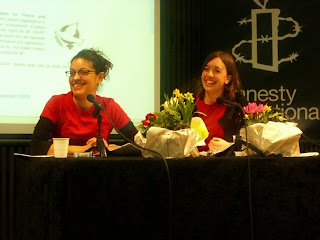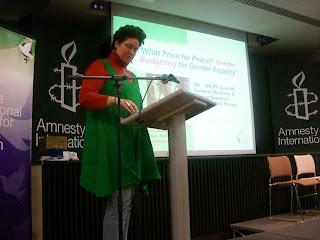The WILPF UK AGM was presented by Vice Presidents Amy Barrow and Katherine Ronderos. Marion Boker, a consultant for Human Rights and Gender Issues from Germany, was invited to share a special presentation entitled “What Price for Peace: Gender Budgeting for Gender Equality.”

Members of WILPF celebrated the success of the Voices of African Women seminars, having networked with women from different countries. WILPF enabled women from Diaspora to engage with politicians in the UK and strengthen grassroot campaigns for the movement of African women in conflict. Having our campaigns assistant Sasha Jesperson on board has enabled WILPF to expand campaigning opportunities on a broader level. It was great to see interns and younger members on the executive committee, which should hopefully attract young women to join the organisation as active members. The ‘serious’ part of the AGM ended nicely with a musical rendition from Raised Voices, who are a political street choir.
Women of WILPF joined in with the singing about Palestine: “Free Palestine. What have they done? Take down the wall. Give back the land.”
Keynote Presentation
Marion Boker’s presentation about gender budgeting was quite a new angle, which neither I nor WILPF have much experience about. Boker stated that society needs social spending for health, better workplace, child care and education, as opposed to expenditure for war. Today, we have tools and enshrined rights to see that the government implement this. Finances for women’s needs are marginalised. In 2003, 0.04% of total European Commission Aid supported women-specific projects and programs, which clearly suggests that there is less for women and more for war. Failed budgetary on women is NOT an old metaphor. Figures for social spending have been constant from 1988 to present day, with only a small increase in 2002. Women have been fixed in traditional gender roles, such as looking after children and elderly – which of course earns women no money.
According to Boker, CEDAW are strongest on gender budgeting and are campaigning for this. The financial crisis is naturally offering new challenges which need to integrate around gender budgeting. Boker affirmed 
A report in February 06 2009 from CEDAW in Geneva reported that:
“The UN Committee is concerned by the impact of the financial crisis on the rights of women and girls.”
This presentation has made WILPF consider gender budgeting and analysis into our general campaign and logistics.
Workshops
After the presentation, 3 workshops, which members of WILPF are working on, were present. The working groups below can be joined by anyone who is interested. Please contact the WLPF office or myself (about the VAW group) for more information: office@ukwilpf.org.uk
- Women, Peace and Security
- Global Economic Justice
- Violence Against Women
As WILPFs co-coordinator of the Violence Against Women working group, I co-facilitated the workshop with Katherine Ronderos. We were fortunate to have two very special Sara Elizabeth Avilez Tome and Maria Amalia Reyes Cartagena from Honduras, to share their experience of violence. These women were in the UK for 2 weeks to raise awareness of gender violence in Honduras. Katherine led the discussion in Spanish, followed by English translations.
Before the interview with the women, a DVD was shown to highlight Sara Elizabeth’s experience, presented by 21st Century. Every 20 days, women are victims of physical abuse or killed by loved ones. Domestic violence is at an unprecedented level in Honduras and due to the level of cases, the police are being trained to think with a 'gender perspective' in order to handle the number of complaints. Furthermore, women are recruited into the police for thorough research and attention to these cases, as sexual violence was seen as a taboo.
Honduras has a population of 7 million people. Since 2007, 10000 cases of domestic violence were reported, which increased by 3.8% in 2008 but these numbers only reflect those who have reported it. Although the Honduran government have outlawed violence against women in 2007, the law is only now being implemented.
Response from the government has been limited and domestic violence is the last stage of action before women are assassinated by their spouse. Sara Elizabeth is working with women and NGOs to identify forms of violence and encourage other women to speak up about their experience before things can get worse.
The topic of patriarchy sparked fresh conversation. Participants suggested that new education need to be in place to teach children at a young age on how to treat people, eradicating old patriarchal attitudes. Sara Elizabeth and Maria agreed that the attitude of men wanting to be ‘more superior’ were spurred by old patriarchal influences and is still one of the biggest factors in Honduras. Women need to understand that these treatments and behaviour is not ‘normal’, and need support, education and awareness.
Sara Elizabeth and Maria are in partnership with CORN to strengthen community support at grassroot level in providing emotional support. Legal promoters provide training about legal instrument to report cases and support for long term processes. They hope to help women break the circle of violence based on economic dependency on their partner by starting micro-business projects like beauty courses, t-shirt making, tailouring etc. Current financial crisis makes it difficult to compete with imported products, which brings them back to their violent partners, however this is the beginning of a growing project, that can hopefully be encouraged by NGOs, and the government.



















1 comment:
Hi...
I have add your Facebook Account..
Nice to see you..
Douzo Yoroshiku Onegaishimasu....
Post a Comment